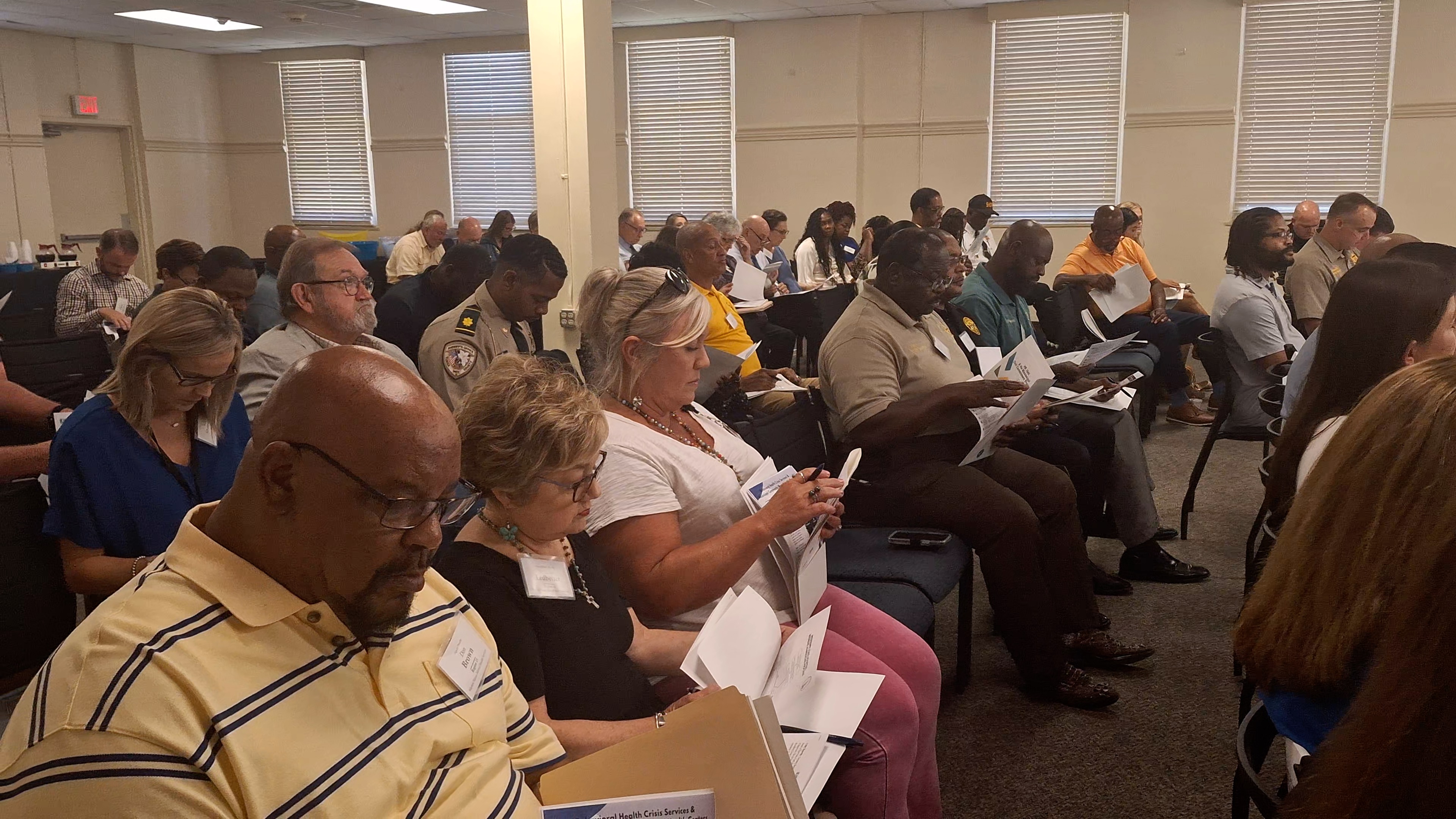
On Wednesday, July 17, 2024, law enforcement officers, chancery/circuit clerks, and community mental health providers gathered at Mississippi State Hospital (MSH) with the goal of learning about the changes to the commitment process and the provision of mental health services in Mississippi that took effect by the passage of HB 1640. Representatives from MSH and the Department of Mental Health (DMH) provided some background on HB 1640 and included a presentation and handouts detailing the changes to the process, including the areas of Community Mental Health Centers (CMHCs) Reporting, Civil Commitment Flowchart, People Waiting in Jail, Transportation, Time Frame for Hearing, Annual Training, and Guardianship or Conservatorship.
James G. “Bo” Chastain, FACHE, Director of MSH, welcomed guests and stressed how important the partnership is with everyone in the room and how valuable it is to the State of Mississippi. He then provided an overview of the CMHC quarterly reporting process and requirements. Each CMHC will provide a quarterly report to the board of supervisors in each county of their region and DMH. Reports will include the occupancy percentage reported by the Crisis Stabilization Unit (CSU) in the region, number of individuals held in jail after the commitment process has been initiated and the number of individuals the CMHC provided treatment to while they were in jail, number of pre-affidavit screenings conducted, number of individuals diverted to a lesser restrictive alternate from commitment, number of CSU unit denials and the reason for denial, summary report of Medicaid claims, and cash balance as of the date of the end of the quarter.
Dr. Tom Recore, Medical Director for DMH, outlined the civil commitment process, walking attendees through a detailed civil commitment flowchart and the technical requirements of holding people in jail. The flowchart contained a detailed guide for each scenario throughout the decision-making process and referenced the sections of Mississippi Code that apply. Before holding someone in jail, the CMHC must explore and exhaust all other options, including CSUs, hospitals, etc. In addition, the chancellor must authorize the jail hold, and the person must be actively violent. A person cannot remain in jail for longer than 24 hours and the CMHC must provide treatment during this timeframe while pending placement at an appropriate facility. An additional 24 hours can be requested by the CMHC and must be approved by the chancellor.
MaCall Chastain, General Counsel for DMH, provided the details of transportation provisions, outlined the time frame for holding a hearing, explained the requirement of DMH to hold annual training for chancery and circuit clerks (provided opportunities for 2024), and explained guardianship and conservatorships. Transportation provisions allows transportation inside or outside the county for a person to access the treatment they need if they are waiting on a bed related to civil commitment. The state currently has 196 Crisis Stabilization beds throughout the state, if a bed is not available in one region, there is a vacant bed in another region. Chancery clerks and CMHCs can see where CSU beds are available through a bed registry, which is updated daily. Previously, the law required chancellors to hold a hearing within 5-10 days. HB 1640 reduces that timeframe to 3-5 days. An extension of an additional 5 days can be requested. DMH will provide training on civil commitment procedures to chancery and circuit court clerks annually. Any healthcare practitioner who conducts the commitment physical and mental examinations may also, at the time of conducting examinations, provide the certification necessary for establishing a guardianship or conservatorship.
Chastain returned to the podium to discuss the goals of the Memorandum of Understanding (MOU) between DMH, State Hospitals, and CMHCs/Crisis Stabilization Units (CSUs). These goals include: Provide ready access to the appropriate level of care needed by individuals experiencing a behavioral health crisis. Prevent unnecessary use of jails as holding facilities. Prevent unnecessary admissions to state hospitals. Collaboratively communicate with the Chancery Clerks, Chancery Judges, and Sheriffs to inform them on changes made by the Legislature to the civil commitment laws. Make maximum utilization of each region’s CSU bed capacity. Expand State Hospital admission hours to include Saturdays and Sundays to expedite referral of civilly committed individuals served in CSUs who need admission to a State Hospital.
Julie Johnson, Director of MSH Utilization Management, and Lisa Nichols, Director of MSH Admissions, discussed the MSH weekend admissions process, providing step-by-step scenarios for a successful admission.
Guests then had an opportunity to ask the panel questions before enjoying lunch together.
